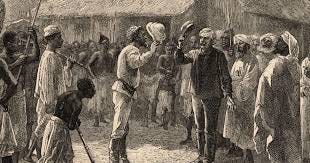“Who are you, and where did you come from?" the young boy asked as he rubbed his ankles where the cords previously held him in bondage. Dr. David Livingstone and his companions had just set 80 slaves free by chasing off their captors. Those captors had themselves once been slaves but returned to the business now as the ones who would kidnap and sell other Africans to the Arabs. At seeing Dr. Livingstone they fled immediately without a shot being fired.
The now-freed Africans told Dr. Livingstone about how the slave traders had killed one of their babies by throwing her on the ground because she was slowing them down. They killed two women who tried to loosen their bonds to stop the pain. And they axed a man who tried to undo his neck restraint.
In his journal, Dr. Livingstone reasoned that if these slave traders were actually motivated by self-interest for profit, they would not have killed any of those they could use for money. Instead, these stories confirmed to him that the slave industry was motivated by hate and wickedness. It was, he said, “not possible to overstate the evil of slavery.”
Dr. Livingstone came to Africa as a missionary, explorer, and medical doctor. He ended up also setting slaves free. He had a reputation among the slaveholders for his anti-slavery stance. Livingstone wanted to see African families thrive, to see them have education for both their boys and girls, and to see them develop their own industry so that they had work other than pillaging and kidnapping for slavery.
The tribes he encountered were still in the darkness of Animism. He brought them the Christian Gospel and taught them that God, their Creator, was not distant but so loved the world that he sent his only begotten Son. Christianity began to transform those parts of Africa.
These 80 slaves didn’t want to leave his side. However, he helped them establish a new life on a missionary outpost where they would be safe from the slave traders. He had more work to do and more to set free.
Years went by without anyone in England hearing from Dr. Livingstone, and false reports of his death circulated. The reporter, Henry Morton Stanley, decided to set off into Africa to find Dr. Livingstone. He wrote in his journal that when he came upon his camp, he said, “Dr. Livingstone, I presume?”
Dr. Livingstone led a life devoted to Christ. He extended the love of Christ to those in both physical and spiritual pain. He set captives free from slave traders and from the Devil. Those who are slaves to the Devil do not know they are. Yet, when freed by Christ, they react like that young boy.
The boy spoke up and directed a question to Dr. Livingstone. “Those men put us in bonds; they beat us and starved us. We thought they would kill us, but you freed us. Who are you, and where did you come from?”
Do you ask that of Christ? Do you want life so dearly that you would set off like Stanley to seek and find it no matter the difficulties? Like that young boy, do you say in amazement to Christ, “Who are you? Where did you come from? You set us free!”
Those lost in darkness have seen a great light. As our culture remembers Christ at this time of year, turn to Him as your Savior. You can work all your life to be economically free and yet die in the worst kind of bondage. Like those slave traders who had been slaves themselves, the sinner who is only outwardly freed will return to commit worse sins. Place your faith in Christ as your savior and the only one who can give you freedom.





Great piece! Thank you for sharing! Merry Christmas to you and your family!